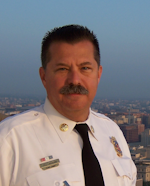Taking on the assignment of fire chief or adding more responsibilities to a member’s career for a community is a daunting challenge. The “Dozen That Make the Difference” character traits presented in this series are listed in no special order or priority. Part one of this series, in the June issue, discussed the first four character traits listed in the chart on this page. The second part looks at the next four character traits a person should possess to be a good candidate as fire chief or to move up in the ranks within the department.
5. Be Honest,
Direct and Clear
The truth is required at all times, up and down the chain of command. There are no exceptions. The organizational value we trade the most on is the public trust. Without that trust, we will lose support quickly and it takes years to rebuild it. Maintaining trust means telling the truth, even when it is not pleasant. Sometimes, officers (supervisors) will not give direct and clear instructions for fear that a “direct” approach will hurt someone’s or a group’s feelings.
6. Learn New Systems
Perhaps you were promoted from the ranks and have a great understanding of all of the operating systems that make up your government. Likely, though, there are nuances that the department head learns by being in the role. Be a quick learner and immerse yourself into the systems that make your new agency work.
One request I made at departments I took over was to ask everyone to delay retiring for at least six months. The senior members appreciated that I acknowledged their organizational experience and abilities by asking them to stay for a short while. This also was a practical concern for the organization in that I didn’t want to experience “brain drain” until I came up to speed in a wide spectrum of areas.
7. Role-Model
Behaviors
You are always under the microscope and you are a role model for many. Your actions are being observed all the time. The American fire-rescue service is a highly visible and highly scrutinized function of government. Think about what you are doing and how it may look to others. One of the best tests to apply is the “Mother Test” – what would your mother say about your behavior? If Mom would not approve, think twice and change the planned behavior.
8. Be a Lifelong Learner
It seems like only yesterday that I graduated from Fairfax County, VA, Recruit School Number 20, but the six months of intensive training was only the beginning of my formal education and my fire service learning. Countless seminars and classroom sessions coupled with a fire administration college degree and currently working toward a graduate degree reflect my need to stay current.
Local community colleges, state fire training institutes and the National Fire Academy are but just a few more ways to keep abreast of the changes occurring in our profession every day. I understand just how busy fire chiefs and ranking members are in every fire-rescue organization. However, the environment all around us is changing (both internally and externally) and it is very easy to become obsolete in the value we offer to our communities.
Next: Community involvement

Dennis Rubin
Dennis L. Rubin is the interim fire chief for the Kansas City, KS, Fire Department. Rubin was the fire chief of the District of Columbia Fire and Emergency Medical Services Department and the Atlanta Fire Rescue Department. He holds a master’s degree from Waldorf University, a bachelor’s degree from the University of Maryland and an associate degree from Northern Virginia Community College. Rubin is a 1993 graduate of the National Fire Academy’s Executive Fire Officer Program and obtained the Chief Fire Officer and Chief Emergency Medical Services Officer designations from the Center for Public Safety Excellence. He is an adjunct faculty member at the National Fire Academy and the author of several fire service textbooks.





